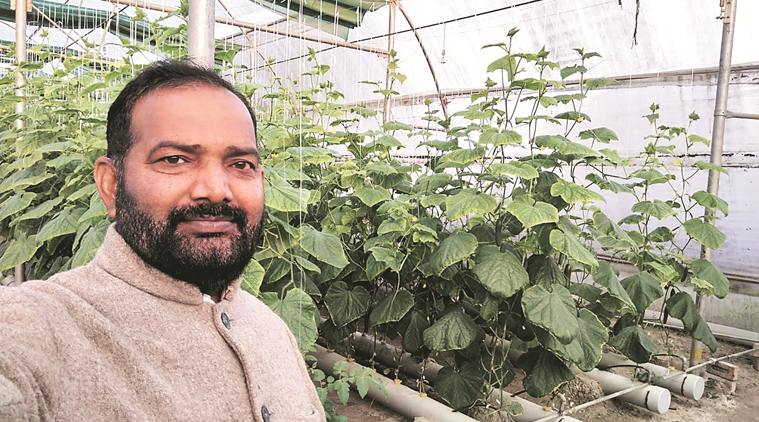Stay updated with the latest - Click here to follow us on Instagram
Una man grows fruits, vegetables without soil
After years of research, Yussouf Khan, 51, is growing fruits and vegetables in his farm through hydroponics, a form of precision agriculture in which crops are grown in vertical stacks of plant beds without use of soil.
 Yussouf Khan, 51, uses a process called hydroponics; in the case of cucumbers (right), one can earn Rs 3.5 lakh per crop in a greenhouse of 1,000 square metres, he said.
Yussouf Khan, 51, uses a process called hydroponics; in the case of cucumbers (right), one can earn Rs 3.5 lakh per crop in a greenhouse of 1,000 square metres, he said.
AT A tiny village in Una, a horticulturist is growing cucumbers, lettuce, capsicum, tomatoes, cherries and strawberries. But his crops don’t grow on soil, they grow in nutrient-rich water.
After years of research, Yussouf Khan, 51, is growing fruits and vegetables in his farm through hydroponics, a form of precision agriculture in which crops are grown in vertical stacks of plant beds without use of soil.
He has installed a hydroponics system in a greenhouse, through which a solution of water and nutrients is fed to the plants stacked in vertical or pyramidal rows of pipes.
“From the nutrient tank, the water solution flows down through the rows due to gravity. When it reaches a tank on the ground, it is lifted up through a pump again and is circulated over and over again. It requires 90 per cent less water as compared to traditional methods of growing,” said Khan, a post-graduate in plant pathology and mycology.
There are other benefits, too. As there is no soil, he doesn’t face issues like weeds and soil-borne diseases. It’s a type of vertical farming and so, very less land and labour are required. It can be done on terraces, backyards and even indoors, where light is fed using LEDs. Moreover, no weedicides, fertilisers or pesticides are used in the technique. According to Khan, the installation of the system requires a one-time investment, but the returns are higher thereafter.
Across the globe, growing urbanisation and shortage of land and water are forcing progressive farmers and experts to adopt such techniques for meeting food requirements. “In the case of cucumbers, one can earn Rs 3.5 lakh per crop in a greenhouse of 1,000 square metres. A single plant yields 5 kg of the fruit and the harvesting time is reduced to only 28 or 29 days. In the Una agricultural market, I sell it for Rs 50 per kg due to its higher nutritional value and crisp quality. Plants grown through hydroponics usually have a richer flavour, which shoots up their demand and price,” said Khan, adding that currently, he is not growing crops commercially but mostly for demonstration purposes.
Khan, who is also a mushroom expert, imparts training in hydroponics at his farm. The sessions are usually attended by students from the agricultural university in Palampur as well as colleges in other areas such as Anandpur Sahib and Jalandhar.
He also sells nutrient solutions and has kept his nutrient formulations secret as they were developed after years of research, involving permutations and combinations of micro- and macronutrients and trace elements.
His expertise is also being used by the National Bank for Agriculture and Rural Development (NABARD), which has signed an MoU with the CSK Himachal Pradesh Agricultural University in Palampur to impart training sessions in hydroponics to farmers.
“The state focus paper of the bank for this year lays special emphasis on hi-tech agricultural practices, including hydroponics, aeroponics (involving a nutrient-rich mist instead of water), use of drones in agriculture, automation of dairies and hi-tech nurseries. Two Krishi Vigyan Kendras (KVKs) in Sundernagar and Dhaulakuan are set to start demonstrating hydroponics to farmers,” said Dr BR Premi, the deputy general manager of NABARD.
Besides Khan, two other farmers in the state, including one of Khan’s relatives, have set up hydroponics units at their farms in Sundernagar and Sirmaur. “In land-starved areas such as urban areas, vertical farming methods such as these can make a single acre worth a hundred,” remarked Dr Premi.







